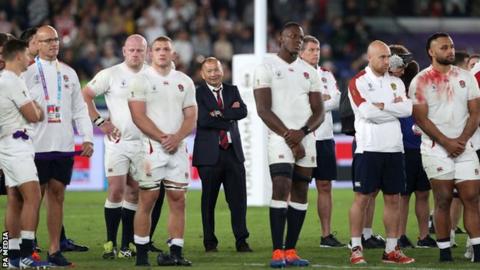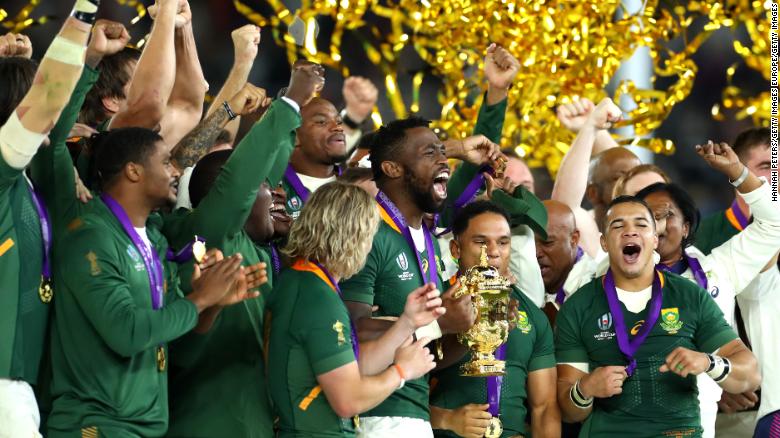Image Credit- CNN International
England’s Rugby Union side were unable to repeat their semi-final heroics from a week earlier in an agonising 32-12 loss to a dominant South Africa in the 2019 Rugby World Cup Final in Tokyo on Saturday.
The Springboks were the dominant side from the very first whistle, and never looked in doubt of sealing their third World Cup crown, largely due to England’s passive display in which they looked light years away from the side that had toppled New Zealand the previous week.
South Africa’s traditional game plan is quite simple – using their massive forward pack to effectively strangle teams into submission, not granting the opposition any leverage whatsoever at the breakdown or set-piece, and taking full advantage of any points when they become available.
All three were executed to near perfection by the Springboks, with England’s cause certainly not helped by England prop Kyle Sinckler’s concussion injury forcing him off after just 2 minutes.
The loss of Sinckler, arguably England’s most dynamic tight-five forward, proved pivotal, as it forced his far less mobile replacement Dan Cole to play almost the entire game at tighthead. The first half continued in this fashion, with the Springboks’ power and dominance, particularly at scrums, far too much for England to handle.
The result of these many first-half penalties at the set-piece against England saw Pollard kick the first 9 of his overall 22 points, with England keeping the half-time score- line a respectable 9-6 through two penalties of their own.
If the first half saw England’s pack dominated but not decimated, the second brought a new wave of Springbok power.
South Africa’s 6/2 forwards/backs split on the bench, as opposed to the usual (andEngland’s formation) 5/3, allowed coach Rassie Erasmus to slowly replace most of his starting pack with fresh legs, which proved a death knell to England’s already waning scrum, forcing two more penalties which Pollard dispatched to make the scoreline 15-6 soon after the interval.
Although Joe Marler’s introduction saw England reduce the scoreline to 15-9 through a rare scrum penalty win, the introduction of replacement props Steven Kitsoff and Vincent Koch quickly saw the Boks re-establish their breakdown dominance. Pollard’s pinpoint accuracy with the boot saw him add another penalty, with England captain Owen Farrell’s accuracy keeping England within touching distance at 18-12 in favour of the Springboks.
South Africa’s perfectly-executed game plan was only missing one thing – tries. The Springboks’ two previous World Cup victories came without scoring a try in either final, winning 15-12 in 1995 and 15-6 – against England – in 2007. 2019 however, would prove to be different.
A venture down the blindside saw the electric Makazole Mapimpi’s kick find Lukhanyo Am, who linked back up with his winger for Mapimpi to score the first try of the game almost untouched.
Pollard’s conversion took the scores to 25-12, and the Boks had one hand on the Webb Ellis Cup. If the engravers hadn’t started etching ‘South Africa’ on the trophy after Mapimpi’s try, they certainly were 5 minutes before full-time. On the opposite touchline, hot-stepping Cheslin Kolbe rounded three England defenders before stepping inside Farrell and racing away to dot down on the right-hand side.
Pollard converted to bring the scores to 32-12, and soon after the final whistle brought jubilation to all those in the rainbow nation.
For England and their coach Eddie Jones, this game will be seen as a massive missed opportunity, particularly given the emphatic way in which they swept aside defending champions New Zealand in the semi-finals. Many saw it as the perfect performance, playing at an intensity that even the All Blacks couldn’t handle. Yet in the final, England seemed bereft of ideas, dumbfounded by the power of South Africa’s forwards. In an interview prior to the final, Jones said his four-year plan leading up to 2019 was set up in the knowledge that England’s semi-final opponents would likely be New Zealand.

Sadly, for Jones and his players, it appears that the final hurdle was not planned to the same level of detail.
Despite this, the Springboks’ victory, continuing their cycle of a World Cup win every twelve years (since 1995), was as glorious as the gold on the Webb Ellis Cup, which was hoisted aloft by the country’s first ever black captain, Siya Kolisi. The image of Kolisi holding up the cup he led his teammates could parallel in significance to the famous image of Nelson Mandela, South Africa’s first black president, handing the trophy to Francois Pienaar in 1995. That victory saw a new dawn to South African Rugby, as they began to embrace the vast swathes of talent provided by black players long ignored by the repressive apartheid policy of their former governments.
With this victory, and Siya Kolisi the inspirational leader behind it, South Africans of all races can begin to believe that the future is bright not only for Springbok Rugby, but for every member of the Rainbow Nation itself. As Kolisi said at full-time: “This is what can happen when we all pull together, when 58 million South Africans become one.”

